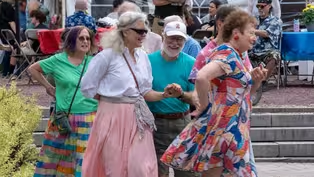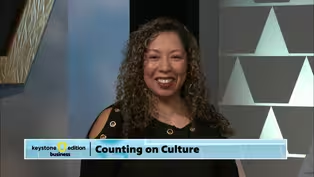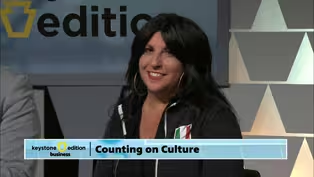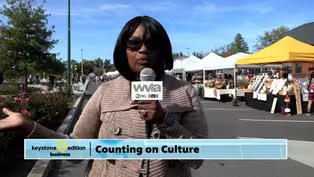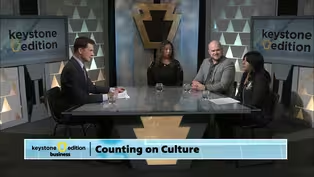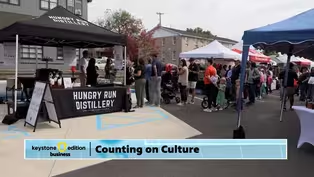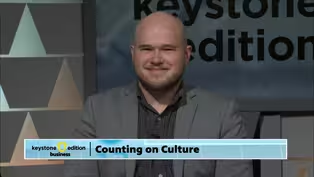Keystone Edition
Counting on Culture
12/9/2024 | 26m 59sVideo has Closed Captions
Cultural celebrations like markets and parades can bring thousands of people together
Cultural celebrations like markets and parades can bring thousands of people together, and they're vital drivers of economic development.
Problems playing video? | Closed Captioning Feedback
Problems playing video? | Closed Captioning Feedback
Keystone Edition is a local public television program presented by WVIA
Keystone Edition
Counting on Culture
12/9/2024 | 26m 59sVideo has Closed Captions
Cultural celebrations like markets and parades can bring thousands of people together, and they're vital drivers of economic development.
Problems playing video? | Closed Captioning Feedback
How to Watch Keystone Edition
Keystone Edition is available to stream on pbs.org and the free PBS App, available on iPhone, Apple TV, Android TV, Android smartphones, Amazon Fire TV, Amazon Fire Tablet, Roku, Samsung Smart TV, and Vizio.
Providing Support for PBS.org
Learn Moreabout PBS online sponsorship- [Announcer] Live from your public media studios, WVIA presents "Keystone Edition Business," a public affairs program that goes beyond the headlines to address issues in Northeastern and Central Pennsylvania.
This is "Keystone Edition Business."
And now, moderator Steve Stumbris.
- Hi, I'm Steve Stumbris.
Cultural celebrations have many direct and indirect impacts on their communities.
Attendees spend money with vendors at events, and they also pay for parking, have dinner at local restaurants, and stay at hotels.
But the impacts go beyond just money.
These celebrations also sustain jobs, support artists, and boost community pride.
WVIA news reporter Sarah Cento has more detail on what these celebrations mean to the area.
- [Sarah] Northeast Pennsylvania is rich in tradition, from parades to festivals, bazaars, and fairs.
Celebrations of culture bring people together as a community, and they can bring a major economic boost.
Events like the Scranton St. Patrick's Parade, the Pittston Tomato Festival, and Wilkes-Barre's Multicultural Parade attract thousands of visitors annually, filling hotels, restaurants, and shops.
These events not only bring in millions of dollars, they support jobs and showcase local businesses.
The hospitality industry benefits as hotels and restaurants fill up, and visitors explore local shops.
Transportation services also see a boost as out-of-towners seek help getting around.
These indirect impacts contribute to the broader economy, community well-being, and long-term regional development.
For more information, head to WVIA.org.
For "Keystone Edition Business," I'm Sarah Cento, WVIA News.
- I'd like to introduce our panelists here to share their perspectives.
First, Flor Gomez is the owner of La Casita De Familia in Shenandoah, Schuylkill County.
Erik Diemer is the founder of the Pocono Pride Festival and is a small business owner.
And Francene Pisano joins us to share her experiences on the board of La Festa Italiana in Scranton.
If you have questions, you can ask at keystone@wvia.org, and I'm looking forward to asking our panelists tonight some questions and learning from you about the impact of cultural celebrations in your regions.
Francene, I'd like to start off with you.
Welcome to WVIA Keystone Edition.
Tell us a little bit about the impact, and it is a huge number of visitors that come to La Festa.
But actually, tell us a little bit about your personal connection.
Why is it important to share culture with the community at March?
- So La Festa Italiana is held annually over Labor Day weekend.
We have about 150,000 visitors that attend over the four-day weekend.
And there's no cost to attend.
We have free entertainment, all types of bands.
We have two stages that, so there's always live entertainment going on.
We have about 65 vendors around the square.
And then there's strolling entertainment and all types of foods.
But it's close and near and dear to me.
This is my 32nd, well, this was my 32nd year on the board.
My mother, my parents came directly from Sicily.
I have their trunk in my living room.
But it's just a great cultural event, but you don't have to be Italian, obviously, to attend.
But it's just a great celebration.
It's held downtown on Courthouse Square, which makes it even more traditional and lively.
It's just a great event.
We have so many people that come from all over, from like about 75,000 guests come from out of the area.
And outlining counties, we have buses that come in, that people come from all the other surrounding states.
It's just a great tradition.
And honestly, I wanted to quit many years, but my kids, my two daughters have been there since they were in strollers, and they love the celebration.
And their friends now participate, and everyone works at our stand.
I manage, my girlfriend and I manage the novelty stand.
I actually design all the T-shirts and purchase all the merchandise.
But all the proceeds from our stand go back to offsetting the cost of the festival.
- Did you do some design work on what you're wearing right now?
- Yes, I did.
So we press on demand.
So we have design set up, and then you pick your shirt and style, and we make them as you wait for them.
But we also have sponsors and sponsorship levels.
So we don't really take any money from the county or anywhere, but it's quite undertaking.
We have to pay security 24 hours to make sure that no one damages any of the vendor stands.
And we pay the ambulance and fire department, and everyone's there all weekend.
So it is quite expensive.
All our entertainment is very costly.
My stand helps offset the cost of that, as well as sponsorships and events and things.
- I know we're gonna talk a little bit more about food when we bring Flora into the conversation, but first, a favorite food that you get at the festival.
- Yeah, so I have to start off with a super salad sandwich from one of our vendors that we absolutely love.
And of course, Unico Porchetta is always a line around the block, and we have some homemade pasta stands.
And it's just a mix.
I, unfortunately, really never get to walk around the whole square.
(laughing) I am stuck behind my tent.
So my daughters will run.
I'll be like, "Go get me that, quick, hurry up."
But I'll start the morning off with a super salad sandwich.
I always say, they take a picture and say, "Breakfast of champions for the festival."
- Oh, I can tell that you're so passionate about this.
It takes that passion.
I know community organizers, you're invested in your community and you wanna share with the community.
So thank you for doing that.
- Yeah, I just wanna add a small, I mentioned this before, a small number of committee members actually put on the festival.
It's like a dozen.
- Small but mighty, huh?
- Yeah, it is mighty.
But you know, it's quite an achievement for the little amount of manpower that go into it and people, yeah.
- Well, Erik, I wanna talk to you next.
The festival that you're most closely associated with, not as long running, but Pride Festivals have been growing in popularity, growing in attendance throughout major cities throughout the U.S., but also here in small towns in Pennsylvania.
What's important about that?
What makes you proud about Pride Festivals growing?
- Yeah, so, you know, I'm a Pocono native, right?
I was born and raised here.
And, you know, things change as time goes on.
So what I think is really beautiful about the Pride Festival is that it is reinforcing the culture that was already in the Poconos, but now it just creates a space for us to celebrate.
- Tell us more about the Pocono Pride Festival.
How long has that been running?
What kind of role do you have?
And what kind of impact does it have on the community, both the economics and broader impact on the community?
- Yes, so the Pride Festival, we started, our first initiative was in 2019 to have flags hung up throughout town.
And then in 2020, we actually did have our first event.
It wasn't in June, it was in September, and we held it at a separate location that was comfortable having us during COVID.
But then in 2021, we decided to hold it in Courthouse Square for downtown Stroudsburg, which is a really nice symbolic space because it's the county seat for the County of Monroe.
So if you're actually looking at the stage and you look through the stage, you'll see our courthouse behind you.
- How important is symbolism like that?
- It's really important, it's really important.
I actually received handwritten letters from some older folks who never believed this was gonna happen in Stroudsburg, and they're very happy that it has.
- So five years in, what do you hope the Pocono Pride Festival five years from now is like?
How big, how many people, what's ahead being planned?
- Yeah, so we are kind of limited.
We've expanded and grown the event each year, and we've kind of hit the capacity for the number of vendors we can fit in Courthouse Square.
We've used all the side streets and as much space as we could.
One of the challenges for our event is we are nervous about some maybe not as proud members who attend.
So we wanna make sure that we're maintaining a very safe event and have emergency vehicles stationed throughout the event with easy egress, but also a secure event that vehicles and people can't get into it.
So for the Pride Festival specifically, there's a whole additional safety layer that we have to plan into it.
But economically speaking, it's a rather fun event.
In downtown Stroudsburg, a lot of events are held on Saturday.
For us, Sunday is a free parking day.
So we decided to take advantage of that and we have our event on Sunday.
And the other reason why we've planned it that way is so attendees behave themselves a little bit better.
If you have it on a Friday night or a Saturday night, things might get rowdy.
So our event is just held Sunday afternoon, nice and easy in the daytime and it's a safe and colorful event for all.
- Sounds like you've put a lot of thought, you and the other organizers do put a lot of thought into this and that's intriguing the additional concern for safety that goes into designing and celebrating a Pride Festival.
- It sounds like a challenge with all the safety measures, but it's actually a great opportunity because we now have the state police, the local police departments and the sheriff departments and the fire department, of course, all participating in the event.
So yes, they're there for safety, but they're also there for outreach.
So it's a nice opportunity for the whole community.
- That's an important connection to make in a community.
Well, Flora, I wanna talk about the connections between festivals and small businesses.
I wanna ask you about your experience as a small business owner and actually the start of your business and how that was connected with the Heritage Festival in Shenandoah.
- Well, we started by selling tamales and when I say we, I mean my husband's family and I now back in Mexico, they're from Mexico and they did a lot of different businesses.
They sold food and a lot of other commercial ones.
So we started selling tamales.
I said, hey, I was like, why don't I sell tamales?
You guys make tamales, I'll sell them for you.
So I did with coworkers and friends.
It was a big hit.
Like there was people who didn't even know what a tamale was, but they tried it.
And then there was a Heritage Day Festival.
So the church asked many of the members, they want a stand to represent Mexico who would like to participate.
So we were one of the participants and we have participated ever since.
And we saw that there was so much love for our food.
People loved it.
Like we would sell out all the time.
We'd always sell out.
So eventually we're like, well, hey, maybe we should think about opening up a business.
We were selling tamales and when I sold them, they'd be like, do you guys have other food you could bring?
So I took orders and there was a property that they had closed.
It was a business.
They used to sell burgers and stuff and it was up for sale.
So we're like, ah, let's look into it.
Well, we did.
We purchased a building and it took us a little bit, but at the end of the year, we opened our restaurant, La Casita de Familia.
It's a family business.
So we thought that would be the best name, La Casita de Familia, which means the little house of the family.
So it's a small restaurant, but let me tell you, I don't know how much, how you guys can even get so much food out of that small kitchen.
I don't know how we do it, but you know, I say, you know, God helped us.
We got our restaurant blessed the day before Thanksgiving of 2005.
Father Winnie came and he blessed the restaurant and we opened the very next day on Thanksgiving day.
And we've been open since then.
So we're open now 19 years.
- 19 years.
- Yes.
- Has there been parallels between the growth of the community, festivals, events, and growth of your restaurant?
- Yes.
We have the Heritage Day now has been combined with Kielbasa Festival.
After COVID, they combined the two events, but I mean, Shenandoah just itself is a diverse community.
It was made up of immigrants, of Lithuanians, Polish, Italians, so many more.
I can't even say all of them now.
We have Mexican communities coming in, Dominican, Puerto Rican, Honduran.
It keeps growing.
We have so much diversity there.
We have so many other restaurants growing.
Our parade keeps getting bigger and bigger.
We have people from India now that are participating, Jamaica, so it keeps growing.
And a lot of those bring their food in.
And we've noticed there's more and more restaurants opening up from different cultures because they see people try the food in Shenandoah.
They always say, "If there's so much culture "there in Shenandoah, that parade itself, "it just represents it."
And I always tell people, I was like, "You know, you go to Shenandoah, buy kielbasa, "and then you go eat Mexican food."
And of course, you all know Mrs. T's is there.
So I mean, there's so much in Shenandoah.
It's a very small town, but so culturally diverse.
And I mean, just these small events have boosted us because we have so many people that come from out of town.
They come for the kielbasa festival.
We remain open.
Our restaurant, it doesn't open early in the day.
We open around like two o'clock in the afternoon before the festival is over.
And we have people that come and dine in after the festival who didn't get a bite to eat 'cause they were trying other food, but then they come and they stay and eat at our restaurant.
- Stay after the festival.
Well, I wanna share with viewers a little bit more about how festivals bring communities together and how, in addition, they're a fantastic avenue for small businesses to get their name out there to new customers.
Some vendors shared their thoughts with WVIA when we stopped by the Fall Festival in Lewisburg.
- Well, events like this, like the Fall Festival, support our businesses locally and even if people are coming from out of town, they're coming here and they might not know.
They might not usually go on the Strip or even some of them might not be from the Strip, but from the main street right here.
And so it brings people into the community from far and wide.
And then the people in the community get to sample the wares of what's available not so far from here or right here.
- Any events locally, usually outdoor ones, definitely have a huge impact on the business.
It helps bring people in.
I also have a website and do a lot of online sales.
So it helps bring people just to see what products I have and can bring them locally there too.
- I think for a starting business like me, I'm very new.
This is my first year being in business.
So an event like this is very important.
It gets my name and it gets my products out into the community and into the people's hands.
- Yeah, well, so as a visitor, it's really great to have everyone in one place 'cause you can get a good sample of the different flavors, the different cultures, the artisans, the people that are local to the area, what your culture has to offer.
- So from local businesses, from brand new businesses, to visitors from Wisconsin, to a small town in Lewisburg, love seeing what a festival can do.
Erik, we touched a little bit on how perhaps not every local business is going to be on the same page or understand what 100,000 people or even 500 people outside their front door can do.
As an organizer, how do you communicate that?
How do you communicate the benefits of that?
And well, do that hard work of community organizing.
- Yeah, so in my experience, I've noticed that a lot of brick and mortar business owners in town are frustrated with events sometimes because the parking is disrupted, the flow of traffic on the street is disrupted, and it might scare away some of their regular customers.
So when I coordinate events, I reach out to each business individually and I just let them know that the event is happening.
I invite them to it.
And I even extend a courtesy that if the event is disrupting their block, they're free to set up a table outside their store for free.
And that way they're not shut out, there's not a vendor plopped in front of their brick and mortar store they pay rent and taxes to be at.
And that way they can participate in the event without it being a financial barrier.
- You have a perspective as a small business owner and involvement in small businesses.
How does that perspective add to your role as a community organizer and add to the way you're able to communicate with those business owners?
Tell us a little bit more about that.
- Yeah, so my family actually runs a gift shop in Courthouse Square for downtown Stroudsburg.
So we are disrupted basically every Saturday for the farmer's market.
And I think 13 of the other 26 weekends are also clogged up with events.
So there's a lot of disruptions.
We are always happy as a business to set up at the event the first year and see how it goes.
Unfortunately, we find that on event days, sales are usually a little bit lower than they would be for a normal Saturday or Sunday.
But we look at it as an opportunity to get people to see our store.
I can't tell you how many locals say, "Oh, you've been here for 10 years, we never saw you."
And so we'll do an activity, a little free activity or we'll set up a photo op.
So that way folks can take a photo with a character or with something that has our logo in the background and then use that as an opportunity to get people in the door.
- What about return visitors?
And Francene, I think I wanna ask you to talk a little bit about Scranton.
When 150,000 people visit over the four days of La Festa, how do you know that they're coming back?
How does the community know what the long-term impact of that event has been?
- So personally, I manage our social media as well.
So I can tell who's coming back because they reach out over and over every year and ask, "Will this be there?
"Is this vendor gonna be there?
"Where can I find this stand?"
We do have a brochure that has the map of all the vendors and most of the vendors stay in the same spot because they want to, the guests may not know what the name was, but they remember, "Oh, it's on this street, "over here on the corner."
And even at our stand, we have people that come every year from out of state and they want our souvenirs.
They want to bring back Italian merchandise.
They want to buy Scranton merchandise for their families, their grandkids.
Just in the communication between our social media and meeting all the guests, they return every year and they'll reach out to us.
Like I said, they'll email, they'll post on social media asking, "Where's this again?
"I was here last year, two years ago."
They want to have the same experience as they did before and enjoy.
We have the free live entertainment and the guests can set out their lawn chairs and we'll have guests come Friday morning at 7.30 and start lining their chairs up.
(laughing) And they'll reach out again.
- What does hotel bookings look like and how far in advance?
- Yeah, the hotels are, they're pretty far in advance because there could be other events going on that weekend at the train station or the concerts at Montage.
So the hotels get booked up pretty early and of course the vendors are staying there, our entertainment is staying there.
So it is quite a massive area that it reaches in the community because a lot of guests come for the whole weekend or at least two days just to be able to experience other things.
And as you mentioned, sometimes they'll eat at our festival over at lunch but then they'll dine somewhere at dinner at their favorite restaurant or vice versa.
They'll go to an event or go to the train station or somewhere and then come for dinner.
So it does create quite an experience for our guests and they do stay and they visit multiple times.
And then the last day, they'll take stuff to go.
(laughing) They'll get a dozen cannolis or six sandwiches.
So it does last even longer.
But yeah, it does have a great community impact.
- Flor, do you see a similar thing happening in Shenandoah?
So visitors coming in for the Heritage and the Kielbasa Festival.
What's that look like from your perspective?
- There's so many that come.
There's people from out of state, they come because they love Kielbasa.
So they come and then the Heritage Day, just the parade itself, it's just like to top it off.
And then there's so many different foods there.
You can try one thing, another thing.
And like she said, we have people that are like, "Oh, I want one of this, one of that, "one of this, one of that."
And we're packing stuff up because they're taking it with them 'cause they wanna try the Kielbasa, they wanna try the pierogies, they wanna try all the church foods and everything like that, the blinis, but everything you can find in Schuylkill County, you can find it there at the Heritage Kielbasa Festival in Shenandoah.
But it's just, it's wonderful.
Like you say, like so many people come from out of town and they're visiting and then they go and they visit local businesses or like even like Nobles, they'll go there, they take advantage that they're in town, they'll go to Jim Thorpe, they'll go on the trains.
So it's like, it's a great experience, it's a great benefit to all the businesses.
And us ourselves, we're at the Hometown Farmers Market and that's every Wednesday.
Now, we started that because we were looking for, something to do outside of our restaurant to make it grow more because at one point, sometimes business isn't that great, so you start looking.
So we got a food truck.
Now, those food trucks from one place to another, we find different people from different counties that try our food.
They're like, oh, where are you located?
Where are you based out of?
Luckily we have a restaurant now, so we can tell them, oh, we're here and we have so many people that come from Bloomsburg, from Allentown, from different places to try our food.
And then they look at the local businesses and purchase things, but yes.
- That's great.
I love how the diversity of the community is celebrated through the festival, but especially through food.
That's a great way to bridge difference is to appreciate something delicious.
- They always say, how do you get to a man's heart?
It's through his stomach.
(laughing) - I wanna talk about with all of you, but Francene, perhaps first, how can local businesses take advantage?
And this is one final tip.
So I read from a great colleague of ours from the Scranton SVDC, Keith Urgofsky.
He wrote a little while ago about some tips about how small businesses could take advantage, make the most out of big events in Scranton.
So one final tip for businesses to take advantage of festivals happening in their area.
- So for us, it's clear, theme your meals, drinks around Italian.
Being Italian, have some Italian specialty drink.
If you have any type of retail store, we've had some of the local stores do sidewalk sales that weekend, which is great 'cause you have a crowd of people that normally wouldn't even be in front of your doors.
But we do have a lot of the area restaurants that are on the square.
Some of them actually have a stand, so it's very convenient 'cause the restaurant is right across the street from them.
But definitely theme anything that you have in your store.
Do some kind of Italian discount, an Italian cocktail, an Italian drink, an Italian appetizer, or anything that's themed around Italian and Italy, and it always goes over really well.
- Well, Erik and Flor, one word tip each.
- Yeah.
- How can they take advantage of- - I advise a lot of people to do the same thing for my event.
We're limited, only half a day, basically.
So I encourage any other business around town or in the area to match the event.
Have a drag event the night before, something like that.
- So much fun.
And Flor, we're gonna eat, right?
- Yes, yes.
- All right.
- Just food, food, food, that's the most important part.
- Thank you all, and thank you for joining us tonight.
Visit wvia.org/keystoneeditionbusiness to stream episodes and subscribe to the podcast.
Remember, you can watch this episode anytime online on the WVIA app.
For Keystone Edition, I'm Steve Stumbris.
Thanks for watching.
(upbeat music)
Preview: 12/9/2024 | 30s | Watch Monday, December 9th at 7pm on WVIA TV (30s)
Video has Closed Captions
Clip: 12/9/2024 | 4m 27s | Owner Flor Gomez discusses La Casita De Familia in Shenandoah (4m 27s)
Video has Closed Captions
Clip: 12/9/2024 | 4m 6s | Volunteer Francene Pisano discusses Scranton's La Festa Italiana (4m 6s)
Clip: 12/9/2024 | 1m 27s | We spoke with vendors at Lewisburg's annual Fall Festival (1m 27s)
Long-Term Impact of Festivals on Local Business
Video has Closed Captions
Clip: 12/9/2024 | 9m 41s | Our panel discusses the long-term impact of festivals on local businesses (9m 41s)
Video has Closed Captions
Clip: 12/9/2024 | 4m 8s | Erik Diemer, Co-Founder of Pocono Pride Coalition, discusses the Pocono Pride Fest (4m 8s)
Providing Support for PBS.org
Learn Moreabout PBS online sponsorship
- News and Public Affairs

Top journalists deliver compelling original analysis of the hour's headlines.

- News and Public Affairs

FRONTLINE is investigative journalism that questions, explains and changes our world.












Support for PBS provided by:
Keystone Edition is a local public television program presented by WVIA
